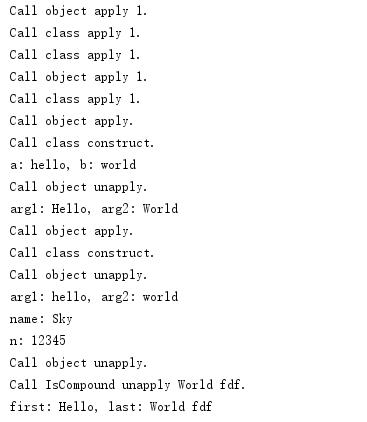快学Scala 第二十二课 (apply和unapply)
Posted AK47Sonic
tags:
篇首语:本文由小常识网(cha138.com)小编为大家整理,主要介绍了快学Scala 第二十二课 (apply和unapply)相关的知识,希望对你有一定的参考价值。
apply和unapply:
apply方法经常用在伴生对象中,用来构造对象而不用显式地使用new。
unapply是当做是伴生对象的apply方法的反向操作。apply方法接受构造参数,然后将他们变成对象。而unapply方法接受一个对象,然后从中提取值。unapply方法返回的是一个Option.
object ScalaRunner {
def main(args: Array[String]): Unit = {
testApply2()
testApplyUnApply()
testCaseClass()
testNumber()
testUnapplyCheck()
}
private def testUnapplyCheck(): Unit = {
"Hello World fdf" match {
case Name(first, last@IsCompound()) => println(s"first: ${first}, last: ${last}")
}
}
private def testNumber() = {
val Number(n) = "12345"
println(s"n: ${n}")
}
private def testCaseClass(): Unit = {
val p: Person = Person("Sky", 20)
p match {
case Person(name, 20) => println(s"name: ${name}")
}
}
private def testApplyUnApply() {
val nameObj = Name("hello", "world")
println(s"a: ${nameObj.a}, b: ${nameObj.b}")
val Name(arg11, arg12) = "Hello World"
println(s"arg11: ${arg11}, arg12: ${arg12}")
val Name(arg21, arg22) = Name("hello", "world").toString
println(s"arg21: ${arg21}, arg22: ${arg22}")
}
private def testApply(): Unit = {
Name()
(new Name) ()
(new Name()) ()
Name()()
}
private def testApply2(): Unit = {
Name(1)
(new Name()) (1)
(new Name) (1)
Name(1)(1)
}
}
case class Person(val name: String, val age: Int)
object Number {
def unapply(input: String): Option[Int] = {
try{
Some(Integer.parseInt(input.trim))
} catch {
case ex: NumberFormatException => None
}
}
}
class Name {
var a = ""
var b = ""
def this(a: String, b: String){
this
println("Call class construct.")
this.a = a
this.b = b
}
def apply() = {
println("Call class apply.")
}
def apply(i: Int) = {
println(s"Call class apply ${i}.")
}
override def toString: String = {
a + " " + b
}
}
object Name {
def apply(): Name = {
println("Call object apply.")
new Name()
}
def apply(i: Int): Name = {
println(s"Call object apply ${i}.")
new Name()
}
def apply(a: String, b: String): Name = {
println(s"Call object apply.")
new Name(a, b)
}
def unapply(input: String): Option[(String, String)] = {
println(s"Call object unapply.")
val pos = input.indexOf(" ")
if(pos == -1) None
else Some((input.substring(0, pos), input.substring(pos + 1)))
}
}
object IsCompound {
def unapply(input: String) = {
println(s"Call IsCompound unapply ${input}.")
input.contains(" ")
}
}
运行结果:

以上是关于快学Scala 第二十二课 (apply和unapply)的主要内容,如果未能解决你的问题,请参考以下文章